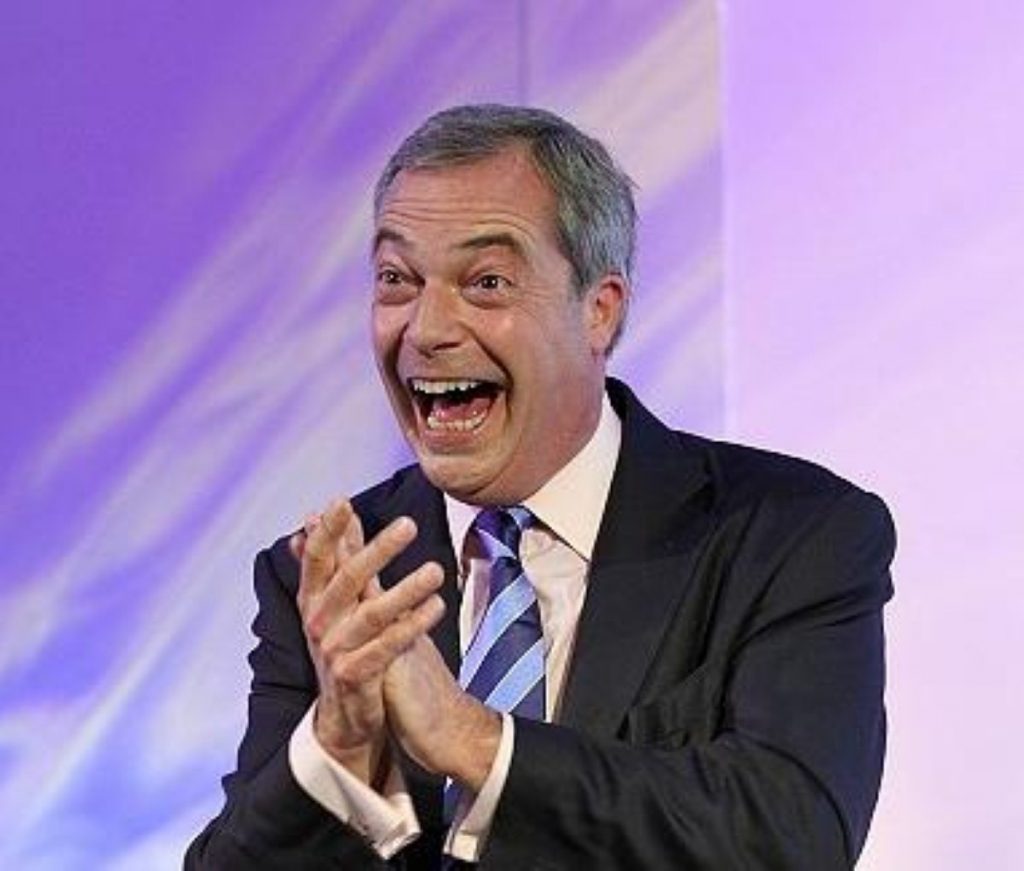PMQs verdict: Another win for Farage
A little trouble over Geneva bank accounts at HSBC made Nigel Farage the clear winner in this week's prime minister's questions.
Labour supporters might complain at this, on the basis that even when Ed Miliband sweeps the floor he doesn't get the credit. Miliband is certainly in need of a triumph after his recent dismal failures. And he looked unusually chipper after his six questions on political donors who held Swiss bank accounts with HSBC, fidgeting between heckles and giggles. If this is what he's like when he does well at PMQs, he may need physically restraining if he wins the general election.
The problem with Miliband's line of attack was that, while the Conservatives come out worse, Labour is not squeaky clean. Cameron usually resorts to bullying his way out of trouble. Today he tried to drag Miliband down with him. It was like that scene in the Lord Of The Rings when Gandalf gets pulled down into the abyss by a large red beast. Only in this version Frodo Farage looks on, raising his eyebrow as he pockets the ring.
There might be six Tory donors in the mix, but – as David Cameron pointed out – so is the man who funded Labour's 2010 campaign. And Stephen Green, the former trade minister, was endorsed by Labour in 2013. It was more than enough to tar Labour with the same brush.


In days gone by, Labour's attack would have been sufficient. When the leader of the opposition points at his enemy and declares "he took the money", he's usually on to a good thing. When backbenchers line up to press Cameron about whether or not he spoke to Green about these bank accounts, the PM is obviously in trouble. For many years the government would have to write off these sorts of exchanges as a bad day at the office.
In 2015, the equation is changed. Winning the bruising encounters of PMQs isn't enough any more. Other parties, untainted by the mutual self-destruction of regular parliamentary bust-ups, stand to benefit. Anyone watching PMQs will end up being as alienated by Labour as they are by the Tory donors.
So where do they turn? Not to the Liberal Democrats, who were virtually absent from this week's questions. Not to the SNP, who have embraced the combative atmosphere of Scottish first minister's questions. That leaves the Greens or Ukip; and as it's Cameron who came off worse, most of the shifters will head over to Farage. He is a man who can afford to spend most of his day in the pub, as Westminster does all the work for him.
Right now there's more to British politics than is suggested by the confrontational two-way set-up of the Commons chamber. To fix its increasingly outdated feel, the parliamentary authorities announced during PMQs that new eye-level cameras are to be installed in the chamber this May to bring viewers even closer to the action.
"At present television coverage of the House of Commons is a bit like looking down on a goldfish bowl due to the high position of cameras in the chamber," says Dr Cristina Leston-Bandeira, one of John Bercow's main advisers on these issues. "This gives the proceedings a somewhat detached quality, emphasising the divide between MPs and audience." The hope is that by providing camera angles which are more 'accessible' to viewers, people will stop hating politicians so much.
It's going to take a lot more than a lower vantage point to fix the Commons. If anything, immersing viewers in the chaos that is the chamber during PMQs is only going to make things worse. Farage needn't be worried – even if he does end up being caught on camera as one of the braying mob.












